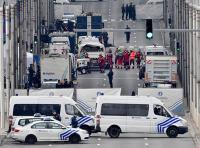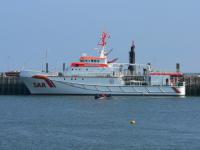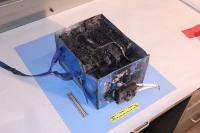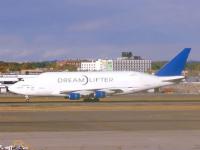-
Air rage a product of class difference
We blame air rage on long flight delays, shrinking seats and a general decline in civility. But the first empirical research study into the phenomenon pegs another culprit — class inequality — for the reason passengers lose it when taking to the so-called friendly skies.
-
-
Improving detection of concealed nuclear materials

Researchers have demonstrated proof of concept for a novel low-energy nuclear reaction imaging technique designed to detect the presence of “special nuclear materials” — weapons-grade uranium and plutonium — in cargo containers arriving at U.S. ports. The method relies on a combination of neutrons and high-energy photons to detect shielded radioactive materials inside the containers.
-
-
Employees in only three U.S. airports subject to security checks
Only three airports in the United States — Atlanta, Miami, and Orlando — require employees to be subjected to security checks before going about their work at the airport. The disclosure was made by TSA administrator Peter Neffenger in a Congressional testimony.
-
-
American Airlines cancels all Brussels flights until 7 April
American Airlines announced it has canceled all flights to and from Brussels until 7 April. The carrier’s decision is in response to the 22 March suicide bombing attack at the Brussels airport. The explosion occurred near the American Airlines counter, and some of the thirty-two people killed in the blast were about to board an AA flight.
-
-
American Airlines cancels all Brussels flights until 7 April

American Airlines announced it has canceled all flights to and from Brussels until 7 April. The carrier’s decision is in response to the 22 March suicide bombing attack at the Brussels airport. The explosion occurred near the American Airlines counter, and some of the thirty-two people killed in the blast were about to board an AA flight.
-
-
Sniffing out a dangerous vapor for detecting fuel leaks, fuel-based explosives
Alkane fuel is a key ingredient in combustible material such as gasoline, airplane fuel, oil — even a homemade bomb. Yet it is difficult to detect and there are no portable scanners available that can sniff out the odorless and colorless vapor. Engineers have developed a new type of fiber material for a handheld scanner that can detect small traces of alkane fuel vapor, a valuable advancement that could be an early-warning signal for leaks in an oil pipeline, an airliner, or for locating a terrorist’s explosive.
-
-
Terrorists have been targeting transportation hubs for decades

More than 7,400 terrorist attacks worldwide between 1970 and 2014 targeted some form of transportation, including airports and aircraft, representing 5.3 percent of all terrorist attacks. More than 460 targets of terrorist attacks between 1970 and 2014 were airports, representing 6.4 percent of all transportation targets. More than 130 targets of terrorist attacks between 1970 and 2014 were subway systems, representing 1.9 percent of all attacks on transportation targets.
-
-
Islamist militants planning “near-term attacks throughout Europe”: U.S.
The State Department has issued a warning to Americans planning travel to Europe, saying that Islamist terror groups are planning more attacks throughout the continent. In a warning unusual in its scale, the State Department said people should exercise vigilance when in public places or when using mass transportation.
-
-
Brussels attacks: a throwback to pre-9/11 terrorism
The terrible scenes in Brussels following a terrorist attack now claimed by Islamic State are a reminder of just how vulnerable airports can be. The most likely and realistic response is increasing security presence around airports with a greater number of random checks. There is no foolproof solution to this security issue, though, and that’s something governments are going to have to admit. Terrorists have the ability radically to disrupt transportation systems, potentially causing loss of life and economic damage in the process, and there is little that can be done to stop them. For some time, terrorists pursued the much more difficult task of attacking aircraft while largely ignoring easier targets. The attack in Brussels shows the reality of renewed efforts against “soft targets” with the potential to bring about chaos to transportation systems.
-
-
Mathematics helps search and rescue ships sail more safely in heavy seas

Fast ships deliver all kinds of services in fields such as disaster response, the fight against crime, the provision of supplies for oil and gas platforms, and the transportation of wind farm maintenance personnel. Each year, however, around 100 such ships worldwide are lost or damaged in heavy seas, with around 2,500 casualties in 2013. A unique new computer model built on highly complex mathematics could make it possible to design safer versions of the “fast ships” widely used in search-and-rescue, anti-drugs, anti-piracy, and many other vital offshore operations.
-
-
NTSB issues safety recommendations for on-flight lithium batteries

The National Transportation Safety Board (NTSB) issued two safety recommendations Tuesday physically separate lithium batteries from other flammable hazardous materials stowed on cargo aircraft and to establish maximum loading density requirements which restrict the quantities of lithium batteries and flammable hazardous materials.
-
-
Passengers on trans-Atlantic flights will spend more time in the air as a result of climate change
Planes flying between Europe and North America will be spending more time in the air due to the effects of climate change, a new study has shown. By accelerating the jet stream — a high-altitude wind blowing from west to east across the Atlantic — climate change will speed up eastbound flights but slow down westbound flights, the study found. The findings could have implications for airlines, passengers, and airports.
-
-
Faster airport lines with facial recognition
More and more people are travelling by plane, so automating airport security checks makes sense. The use of biometric features is a way to identify people at airports. New technology detects and tracks you from the second you arrive at the airport until you’re out of the arrivals hall at your destination.
-
-
Navigations systems are vulnerable to hackers
When it comes to route planning, drivers have almost blind faith in GPS. The technology plays an important role in identifying location and time in other areas, too. If hackers attack the system, they can cause great damage. Information security researches look to develop defensive measures.
-
-
Airlines could – and should – learn more from near misses

When it comes to flight safety, U.S. airlines are pretty good at learning from accidents. But new research shows airlines should be learning more from accidents that never happen. A new study finds that airlines are flying past an opportunity to increase safety by ignoring too many “near misses.”
-
More headlines
The long view
Prototype Self-Service Screening System Unveiled
TSA and DHS S&T unveiled a prototype checkpoint technology, the self-service screening system, at Harry Reid International Airport (LAS) in Las Vegas, NV. The aim is to provide a near self-sufficient passenger screening process while enabling passengers to directly receive on-person alarm information and allow for the passenger self-resolution of those alarms.
